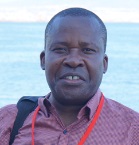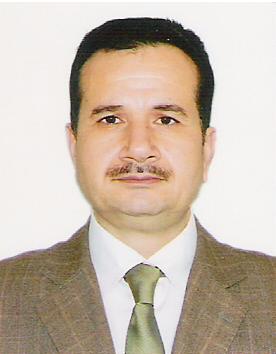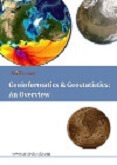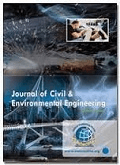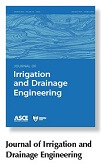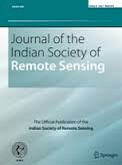Theme: Sustainable Water Resource management for Future Needs
Renowned Speakers
Water Resource Summit 2017
Track 1: Water Resource Planning and Management
Water resource planning and management mainly concerns with surface and ground water, addressing both water quantity and quality, learning to understand human influences on the hydrological system, and apply tools, such as modelling, for the proper integration of hydrological knowledge and analysis in water resources and planning. It also includes with water system, watershed hydrology, hydrology, water quality, remote sensing and GIS and geotechnical engineering. Managing water resources certainly requires knowledge of the relevant physical sciences and technology. But at least as important, if not more so, are the multiple institutional, social or political issues confronting water resources planners and managers.
Related Water resource Conferences | Hydrology Events |Geotechnical Engineering Conferences| Civil Engineering Conferences
2ndworld congress on Remote sensing and GIS July 17-18,2017 Munich, Germany; 4th International Conference on Geology and Geosciences, April 10-11, 2017,Dubai,UAE; World Conference on Climate Change, April 10-11, Dubai, UAE; 3rd International conference on water resource and environment June 26-29,2017,Qingdao,China 29, 2017; International conference on hydrology and meteorology April 10-11, 2017, Kathmandu, Nepal; 14th International Symposium on the interactions between Sediments and Water, May 21-26, 2017,Taormina, Sicily, Italy; International conference on land use and water quality (LuWQ2017) may29- june01, 2017, The Hague, Netherlands.
Water Resources, Climate, & Society Group, Environmental and Water Resources Engineering | ASCE, Indian water resources society, American water resources association, Indian association of soil and water conservationists
Track 2: Water Quality Modelling
Water in rivers, aquifers, and lakes naturally contains many dissolved materials, depending on atmospheric inputs, geological conditions, and climate. These materials define the water’s chemical characteristics. Its biological characteristics are defined by the flora and fauna within the water body, and temperature, sediment load and colour are important physical characteristics. Water “quality” is a function of chemical, physical, and biological characteristics but is a value-laden term because it implies quality in relation to some standard.
Related Water resource Conferences | Hydrology Events |Geotechnical Engineering Conferences| Civil Engineering Conferences
2ndworld congress on Remote sensing and GIS July 17-18,2017 Munich, Germany; 4th International Conference on Geology and Geosciences, April 10-11, 2017,Dubai,UAE; World Conference on Climate Change, April 10-11, Dubai, UAE; 3rd International conference on water resource and environment June 26-29,2017,Qingdao,China 29, 2017; International conference on hydrology and meteorology April 10-11, 2017, Kathmandu, Nepal; 14th International Symposium on the interactions between Sediments and Water, May 21-26, 2017,Taormina, Sicily, Italy; International conference on land use and water quality (LuWQ2017) may29- june01, 2017, The Hague, Netherlands.
American Water Resources Association, American Water Works Association Water Conservation Resource Community (AWWA), Association of Water Technologies (AWT), Canadian Water Resources Association (CWRA), National Association of Flood and Storm water Management Agencies (NAFSMA), Indian Geotechnical Society Mumbai
Track 3: Watershed Management
Watershed management is an adaptive, comprehensive, integrated multi-resource management planning process that seeks to balance healthy ecological, economic, and cultural/social conditions within a watershed. It takes into account both ground and surface water flow, recognizing and planning for the interaction of water, plants, animals and human land use found within the physical boundaries of a watershed.
Related Water resource Conferences | Hydrology Events |Geotechnical Engineering Conferences| Civil Engineering Conferences
5th world congress and expo on recycling June 05-07, 2017, Brisbane, Australia; 4th International Conference on Geology and Geosciences, April 10-11, 2017,Dubai,UAE; ; World Conference on Climate Change,, April 10-11, Dubai, UAE; 3rd International conference on water resource and environment June 26-29,2017,Qingdao,China 29,2017; International conference on hydrology and meteorology April 10-11, 2017, Kathmandu, Nepal; 14th International Symposium on the interactions between Sediments and Water, May 21-26, 2017,Taormina, Sicily, Italy; International conference on land use and water quality (LuWQ2017) may29- june01, 2017, The Hague, Netherlands; An international commission for ground water event (Hydro eco) June 19-22, 2017, University of Birmingham, UK.
Water Resources, Climate, & Society Group, Environmental and Water Resources Engineering | ASCE, Indian water resources society, American water resources association, Indian association of soil and water conservationists
Track 4: Water Conservation
Water conservation includes all the policies, strategies and activities made to manage fresh water as a sustainable resource, to protect the water environment, and to meet current and future human demand. Population, household size, and growth and affluence all affect how much water is used. Factors such as climate change have increased pressures on natural water resources especially in manufacturing and agricultural irrigation.
Related Water resource Conferences | Hydrology Events |Geotechnical Engineering Conferences| Civil Engineering Conferences
2ndworld congress on Remote sensing and GIS July 17-18,2017 Munich, Germany; 4th International Conference on Geology and Geosciences, April 10-11, 2017,Dubai,UAE; World Conference on Climate Change, April 10-11, Dubai, UAE; 3rd International conference on water resource and environment June 26-29,2017,Qingdao,China 29, 2017; International conference on hydrology and meteorology April 10-11, 2017, Kathmandu, Nepal; 14th International Symposium on the interactions between Sediments and Water, May 21-26, 2017,Taormina, Sicily, Italy; International conference on land use and water quality (LuWQ2017) may29- june01, 2017, The Hague, Netherlands.
Water Resources, Climate, & Society Group, Environmental and Water Resources Engineering | ASCE, Indian water resources society, American water resources association, Indian association of soil and water conservationists
Track 5: Geotechnical Engineering
Geotechnical engineering is the branch of engineering dealing with the design, construction, analysis of foundations, slopes, retaining structures, embankments, tunnels, levees, wharves, landfills and other systems that are made of or are supported by soil or rock. It plays a key role in all civil engineering projects built on or in the ground, and it is vital for the assessment of natural hazards such as earthquakes, liquefaction, sinkholes, rock falls and landslides.
Related Water resource Conferences | Hydrology Events |Geotechnical Engineering Conferences| Civil Engineering Conferences
2ndworld congress on Remote sensing and GIS July 17-18,2017 Munich, Germany; 4th International Conference on Geology and Geosciences, April 10-11, 2017,Dubai,UAE; World Conference on Climate Change, April 10-11, Dubai, UAE; 3rd International conference on water resource and environment June 26-29,2017,Qingdao,China 29, 2017; International conference on hydrology and meteorology April 10-11, 2017, Kathmandu, Nepal; 14th International Symposium on the interactions between Sediments and Water, May 21-26, 2017,Taormina, Sicily, Italy; International conference on land use and water quality (LuWQ2017) may29- june01, 2017, The Hague, Netherlands.
Indian Water Work Association, Association of Geotechnical and Geoenvironmental Specialists, British Geotechnical Association, International Society of Soil Mechanics and Geotechnical Engineers, Indian Geotechnical Society Mumbai
Track 6: Hydrology
Hydrology is a branch of Earth Science. The importance of hydrology in the assessment, development, utilisation and management of the water resources, of any region is being increasingly realised at all levels. It was in view of this that the United Nations proclaimed the period of 1965-1974 as the International Hydrological Decade during which, intensive efforts in hydrologic education research, development of analytical techniques and collection of hydrological information on a global basis, were promoted in Universities, Research Institutions, and Government Organisations. The World’s total water resources are estimated at 1.36 × 108 Μ ha-m. Of these global water resources, about 97.2% is salt water mainly in oceans, and only 2.8% is available as fresh water at any time on the planet earth. Out of this 2.8% of fresh water, about 2.2% is available as surface water and 0.6% as ground water. Even out of this 2.2% of surface water, 2.15% is fresh water in glaciers and icecaps and only of the order of 0.01% is available in lakes and streams, the remaining 0.04% being in other forms. Out of 0.6% of stored ground water, only about 0.25% can be economically extracted with the present drilling technology.
Related Water resource Conferences | Hydrology Events |Geotechnical Engineering Conferences| Civil Engineering Conferences
2ndworld congress on Remote sensing and GIS July 17-18,2017 Munich, Germany; 4th International Conference on Geology and Geosciences, April 10-11, 2017,Dubai,UAE; World Conference on Climate Change, April 10-11, Dubai, UAE; 3rd International conference on water resource and environment June 26-29,2017,Qingdao,China 29, 2017; International conference on hydrology and meteorology April 10-11, 2017, Kathmandu, Nepal; 14th International Symposium on the interactions between Sediments and Water, May 21-26, 2017,Taormina, Sicily, Italy; International conference on land use and water quality (LuWQ2017) may29- june01, 2017, The Hague, Netherlands.
International Association of Hydrological Sciences (IAHS), National and Regional Hydrological Associations, American Institute of Hydrology, International Association of Hydro geologists, British Hydrological Society
Track 7: Hydrometeorology
Hydrometeorology is the science which deals with the movement of water and water vapour in the atmosphere. At the boundary between hydrology and meteorology, hydrometeorology produces an ever more advance knowledge about the water cycle. In general, this cycle is essential to life on earth, but its extremes can be very devastating. Hydrometeorology helps understanding the complex interactions between the weather and the water resources of our planet, in view to harness their power and to inhibit its threats. Hydrometeorology is in need of huge amounts of data collected by hydrological monitoring networks, meteorological monitoring stations, precipitation radars, satellites and further sensing systems.
Related Water resource Conferences | Hydrology Events |Geotechnical Engineering Conferences| Civil Engineering Conferences
5th world congress and expo on recycling June 05-07, 2017, Brisbane, Australia; 4th International Conference on Geology and Geosciences, April 10-11, 2017,Dubai,UAE; ; World Conference on Climate Change,, April 10-11, Dubai, UAE; 3rd International conference on water resource and environment June 26-29,2017,Qingdao,China 29,2017; International conference on hydrology and meteorology April 10-11, 2017, Kathmandu, Nepal; 14th International Symposium on the interactions between Sediments and Water, May 21-26, 2017,Taormina, Sicily, Italy; International conference on land use and water quality (LuWQ2017) may29- june01, 2017, The Hague, Netherlands. International commission for ground water event (Hydro eco) June 19-22, 2017, University of Birmingham, UK.
International Association of Hydrological Sciences (IAHS), National and Regional Hydrological Associations, American Institute of Hydrology, International Association of Hydro geologists, British Hydrological Society, Environmental and Water Resources Engineering | ASCE,
Track 8: Eco Hydrology
Eco hydrology is the study of hydrology focused on ecological aspects of hydrological cycle. Eco hydrology is elements of ecology with hydrology and investigates the effects of hydrological processes on the distribution, structure, and function of biota, and on the effects of biotic processes on water-ecosystem processes. These interactions may take place within water bodies, such as rivers and lakes, or on land, in forests, deserts, and other
Related Water resource Conferences | Hydrology Events |Geotechnical Engineering Conferences| Civil Engineering Conferences
2ndworld congress on Remote sensing and GIS July 17-18,2017 Munich, Germany; 4th International Conference on Geology and Geosciences, April 10-11, 2017,Dubai,UAE; World Conference on Climate Change, April 10-11, Dubai, UAE; 3rd International conference on water resource and environment June 26-29,2017,Qingdao,China 29, 2017; International conference on hydrology and meteorology April 10-11, 2017, Kathmandu, Nepal; 14th International Symposium on the interactions between Sediments and Water, May 21-26, 2017,Taormina, Sicily, Italy; International conference on land use and water quality (LuWQ2017) may29- june01, 2017, The Hague, Netherlands.
International Association of Hydrological Sciences (IAHS), National and Regional Hydrological Associations, American Institute of Hydrology, International Association of Hydro geologists, British Hydrological Society
Track 9: Ground Water
Ground water is widely distributed under the ground and is replenish able resource unlike other resources of the earth. The problems in Ground Water Investigation are the zones of occurrence and recharge. The modern trends are to create more opportunity for recharge of ground water from natural sources like rain, percolation dams, etc. The ground water is free from pollution and the ground water storage is free from atomic attacks
Related Water resource Conferences | Hydrology Events |Geotechnical Engineering Conferences| Civil Engineering Conferences
5th world congress and expo on recycling June 05-07, 2017, Brisbane, Australia; 4th International Conference on Geology and Geosciences, April 10-11, 2017,Dubai,UAE; ; World Conference on Climate Change,, April 10-11, Dubai, UAE; 3rd International conference on water resource and environment June 26-29,2017,Qingdao,China 29,2017; International conference on hydrology and meteorology April 10-11, 2017, Kathmandu, Nepal; 14th International Symposium on the interactions between Sediments and Water, May 21-26, 2017,Taormina, Sicily, Italy; International conference on land use and water quality (LuWQ2017) may29- june01, 2017, The Hague, Netherlands. International commission for ground water event (Hydro eco) June 19-22, 2017, University of Birmingham, UK.
Indian Water Work Association, Association of Geotechnical and Geoenvironmental Specialists, British Geotechnical Association, International Society of Soil Mechanics and Geotechnical Engineers, Indian Geotechnical Society Mumbai
Track10: Fluid Mechanics
Fluid mechanics is involved in nearly all areas of Civil Engineering either directly or indirectly. Some examples of direct involvement are those where we are concerned with manipulating the fluid. Sea and river (flood) defences; Water distribution and sewerage (sanitation) networks, Hydraulic design of water/sewage treatment works; Dams; Irrigation; Pumps and Turbines; Water retaining structures. And some examples where the primary object is construction - yet analysis of the fluid mechanics are essential Flow of air in / around buildings; Bridge piers in rivers; Ground-water flow. Notice how nearly all of these involve water
Related Water resource Conferences | Hydrology Events |Geotechnical Engineering Conferences| Civil Engineering Conferences
2ndworld congress on Remote sensing and GIS July 17-18,2017 Munich, Germany; 4th International Conference on Geology and Geosciences, April 10-11, 2017,Dubai,UAE; World Conference on Climate Change, April 10-11, Dubai, UAE; 3rd International conference on water resource and environment June 26-29,2017,Qingdao,China 29, 2017; International conference on hydrology and meteorology April 10-11, 2017, Kathmandu, Nepal; 14th International Symposium on the interactions between Sediments and Water, May 21-26, 2017,Taormina, Sicily, Italy; International conference on land use and water quality (LuWQ2017) may29- june01, 2017, The Hague, Netherlands.
Division of Fluid Dynamics - American Physical Society, Fluid Power Society of India, Indian Society of Mechanical Engineers, National Society of Fluid Mechanics and Fluid Power IIT Bombay
Track 11: Remote Sensing and GIS for Watershed Analysis
Geographic information system (GIS) is a system designed to capture, store, manipulate, analyse, manage, and present all types of spatial or geographical data. The acronym GIS is sometimes used for geographical information science or geospatial information studies to refer to the academic discipline or career of working with geographic information systems and is a large domain within the broader academic discipline of Geo informatics. Remote sensing is the process where the Remote sensors collect data by detecting the energy that is reflected from earth. These sensors can be on satellites or mounted on aircrafts. The electromagnetic radiation is normally used as an information carrier in remote sensing. Remote sensors gather information by measuring the electromagnetic radiation that is reflected, emitted and absorbed by objects in various spectral regions, from gamma-rays to radio waves.
Related Water resource Conferences | Hydrology Events |Geotechnical Engineering Conferences| Civil Engineering Conferences
5th world congress and expo on recycling June 05-07, 2017, Brisbane, Australia; 4th International Conference on Geology and Geosciences, April 10-11, 2017,Dubai,UAE; ; World Conference on Climate Change,, April 10-11, Dubai, UAE; 3rd International conference on water resource and environment June 26-29,2017,Qingdao,China 29,2017; International conference on hydrology and meteorology April 10-11, 2017, Kathmandu, Nepal; 14th International Symposium on the interactions between Sediments and Water, May 21-26, 2017,Taormina, Sicily, Italy; International conference on land use and water quality (LuWQ2017) may29- june01, 2017, The Hague, Netherlands. International commission for ground water event (Hydro eco) June 19-22, 2017, University of Birmingham, UK.
Geoscience and Remote Sensing Society, American Society for Photogrammetry and Remote Sensing, Indian Society of Remote Sensing, The Imaging and Geospatial Information Society, Japan Society of Photogrammetry and Remote Sensing (JSPRS). Environmental and Water Resources Engineering | ASCE,
Track 12: Environmental Engineering
Environmental engineering deals with the combination of sciences and engineering principles to improve the natural environment, to provide healthy water, air, and land for human habitation and for other organisms, and to clean up pollution sites. Environmental impact assessment is the formal procedure used to anticipate the environmental consequences of a plan, policy, program, or project prior taking the decision to move forward with the proposed action.
Related Water resource Conferences | Hydrology Events |Geotechnical Engineering Conferences| Civil Engineering Conferences
2ndworld congress on Remote sensing and GIS July 17-18,2017 Munich, Germany; 4th International Conference on Geology and Geosciences, April 10-11, 2017,Dubai,UAE; World Conference on Climate Change, April 10-11, Dubai, UAE; 3rd International conference on water resource and environment June 26-29,2017,Qingdao,China 29, 2017; International conference on hydrology and meteorology April 10-11, 2017, Kathmandu, Nepal; 14th International Symposium on the interactions between Sediments and Water, May 21-26, 2017,Taormina, Sicily, Italy; International conference on land use and water quality (LuWQ2017) may29- june01, 2017, The Hague, Netherlands.
Association of Environmental Engineering &Science Professors, The Association of Civil &Environmental Engineers, Environmental &Water Resources Institute (EWRI), Environmental Professional Association, Association of Environmental & engineering Geologists.
Track 13: Climate Change
Climate change impacts on hydrology and water resources. Even in the absence of a human-induced climate change, hydrological behaviour will vary not only from year to year but also from decade to decade. They show that natural multi-decadal (30-year) variability in average annual runoff is high across most of Europe and that this natural variability in runoff in mid-latitude Europe is greater than the simulated signal of climate change. In northern and southern Europe, the magnitude of climate change by the 2050s is greater than the magnitude of natural variability. Whereas in other areas, the climate change signal will be larger than past experience.
Related Water resource Conferences | Hydrology Events |Geotechnical Engineering Conferences| Civil Engineering Conferences
2ndworld congress on Remote sensing and GIS July 17-18,2017 Munich, Germany; 4th International Conference on Geology and Geosciences, April 10-11, 2017,Dubai,UAE; World Conference on Climate Change, April 10-11, Dubai, UAE; 3rd International conference on water resource and environment June 26-29,2017,Qingdao,China 29, 2017; International conference on hydrology and meteorology April 10-11, 2017, Kathmandu, Nepal; 14th International Symposium on the interactions between Sediments and Water, May 21-26, 2017,Taormina, Sicily, Italy; International conference on land use and water quality (LuWQ2017) may29- june01, 2017, The Hague, Netherlands.
Association of Environmental Engineering &Science Professors, The Association of Civil &Environmental Engineers, Environmental &Water Resources Institute (EWRI), Environmental Professional Association, Association of Environmental & engineering Geologists.
Track 14: Foundation Engineering
A foundation is the lowest part of the building structure. It is the engineering field of study devoted to the design of those structures which support other structures, most typically buildings, bridges or transportation infrastructure. It is at the periphery of Civil, Structural and Geotechnical Engineering disciplines and has distinct focus on soil-structure interaction. It is also called as ground sill, which transfers loads to the ground. It is generally broken into two categories, Shallow foundation and Deep foundation
Related Water resource Conferences | Hydrology Events |Geotechnical Engineering Conferences| Civil Engineering Conferences
2ndworld congress on Remote sensing and GIS July 17-18,2017 Munich, Germany; 4th International Conference on Geology and Geosciences, April 10-11, 2017,Dubai,UAE; World Conference on Climate Change, April 10-11, Dubai, UAE; 3rd International conference on water resource and environment June 26-29,2017,Qingdao,China 29, 2017; International conference on hydrology and meteorology April 10-11, 2017, Kathmandu, Nepal; 14th International Symposium on the interactions between Sediments and Water, May 21-26, 2017,Taormina, Sicily, Italy; International conference on land use and water quality (LuWQ2017) may29- june01, 2017, The Hague, Netherlands.
International Society for Soil Mechanics and Geotechnical Engineering, International Society for Soil Mechanics and Geotechnical Engineering, American Society of Civil Engineers (ASCE), ASME Foundation, Environmental and Water Resources Engineering | ASCE
ConferenceSeries Ltd Conferences invites all the participants from all over the world to attend 1st Global Geotechnical and Water Resource Engineering Summit-2017 during September 18-19, 2017 in Hong-Kong, Macau which includes prompt keynote presentations, Oral talks, Poster presentations and Exhibitions.
Geotechnical and Water Resource Engineering Summit-2017 conference will make the perfect platform for global networking as it brings together renowned speakers, researchers, business persons across the globe to a most exciting and memorable scientific event filled with much enlightening interactive sessions, world class exhibition and poster presentations. Advances in the field of Water Resource Engineering and Geotechnical Engineers are one of the crucial factors in the economic prowess of the developed countries. Also for the developing countries, adoption of innovative Water Resource techniques and various implementations to conserve water is paramount for advancement of their economies.
Target Audience:
- Engineers who are specialized on the particular topics like Civil Engineers, Structural Engineers, Mechanical Engineers
- Building and construction professionals
- Building Material manufacturers.
- Geotechnical Engineers
- Water Associations and Societies
- Business Entrepreneurs
Introduction
Water is our planet’s life-giving force. But the water needed to keep us healthy, to produce our food and energy, to support commerce and maintain ecosystems is too often threatened by poor management and short term decision-making which prioritises profits over people and the environment.
Scope and Importance:
Water Resources Management is an international, multidisciplinary forum for the publication of original contributions and the exchange of knowledge and experience on the management of water resources. In particular, the journal publishes contributions on water resources assessment, development, conservation and control, emphasizing policies and strategies. Contributions examine planning and design of water resource systems, and operation, maintenance and administration of water resource systems.
World water resources:
The total water resources in the world are estimated in the order of 43 750 km3/year, distributed throughout the world according to the patchwork of climates and physiographic structures. At the continental level, America has the largest share of the world’s total freshwater resources with 45percent, followed by Asia with 28percent, Europe with 15.5percent and Africa with 9percent. In terms of resources per inhabitant in each continent, America has 24 000 m3/year, Europe 9 300 m3/year, Africa 5 000 m3/year and Asia 3 400.1 m3/year.
The distribution of water:
At a country level, there is an extreme variability in TRWR: From a minimum of10 m3/inhabitant in Kuwait to more than 100 000 m3/inhabitant in Canada, Iceland, Gabon and Suriname. For 19 countries or territories, the TRWR per inhabitant are less than 500 m3; and the number of countries or territories with less than 1 000 m3/inhabitant is 29. The ten poorest countries in terms of water resources per inhabitant are Bahrain, Jordan, Kuwait, Libyan Arab Jamahiriya, Maldives, Malta, Qatar, Saudi Arabia, United Arab Emirates and Yemen. In the large countries, water resources are also distributed unevenly in relation to the population.
In addition to spatial variability, there is a high variability in time within the year or among different years. This study does not include temporal variability but Shiklomanov (2000) provides estimates on a 67-year data set of the minimum and maximum internal resources for 50 countries
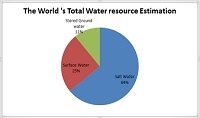
The water resources, of any region is being increasingly realised at all levels. It was in view of this that the United Nations proclaimed the period of 1965-1974 as the International Hydrological Decade during which, intensive efforts in hydrologic education research, development of analytical techniques and collection of hydrological information on a global basis, were promoted in Universities, Research Institutions, and Government Organisations. The World’s total water resources are estimated at 1.36 × 108 Μ ha-m. Of these global water resources, about 97.2% is salt water mainly in oceans, and only 2.8% is available as fresh water at any time on the planet earth. Out of this 2.8% of fresh water, about 2.2% is available as surface water and 0.6% as ground water. Even out of this 2.2% of surface water, 2.15% is fresh water in glaciers and icecaps and only of the order of 0.01% is available in lakes and streams, the remaining 0.04% being in other forms. Out of 0.6% of stored ground water, only about 0.25% can be economically extracted with the present drilling technology.
Why in Asia?
Asia is the leading market for Water Treatment Systems market and is forecast to have highest growth in the next few years due to growing adoption of the water treatment systems in industrial applications. Asia Water Treatment Systems market accounts to xx% of the global market followed by North America. North America is the fastest growing region in adoption of Water Treatment Systems market
Global Market analysis:
The global market for Water Treatment Systems market was estimated to be $XX billion in 2015. The global market for Water Treatment Systems market is estimated to grow at a CAGR of XX% and is forecast to reach $XX billion by 2021. Mining, Agricultural Industries are the major end-users for Water Treatment Systems market.
The water treatment systems market is projected to register a CAGR of 8.52% from 2015 to 2020. Factors such as increasing water contamination, growing awareness about the importance of clean drinking water, and increasing construction activities drive the water treatment systems market. However, high equipment cost acts as a restraint for the market. Scarcity of clean drinking water in developing and under-developed regions provides an opportunity to the water treatment systems market to grow even further.
![]()
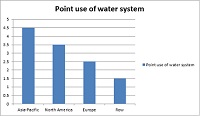
The regional analysis covers:
North America (U.S. and Canada)
Latin America (Mexico, Brazil, Peru, Chile, and others)
Western Europe (Germany, U.K., France, Spain, Italy, Nordic countries, Belgium, Netherlands, Luxembourg)
Eastern Europe (Poland, Russia)
Asia Pacific (China, India, Japan, ASEAN, Australia and New Zealand)
The report has been compiled through extensive primary research (through interviews, surveys, and observations of seasoned analysts) and secondary research (which entails reputable paid sources, trade journals, and industry body databases). The report also features a complete qualitative and quantitative assessment by analysing data gathered from industry analysts and market participants across key points in the industry’s value chain.
A separate analysis of prevailing trends in the parent market, macro- and micro-economic indicators, and regulations and mandates is included under the purview of the study. By doing so, the report projects the attractiveness of each major segment over the forecast period.
Future analysis:
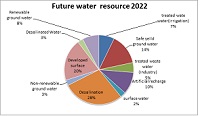
Water consumption and Demand
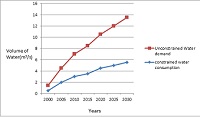
Usage of water analysis:
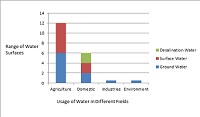
Water Scarcity:
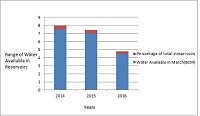
Water resources associations:
1. Water Resources, Climate, & Society Group,
2. Environmental and Water Resources Engineering | ASCE
3. Indian water resources society
4. American water resources association
5. Indian association of soil and water conservationists
References:
1. http://www.awra.org/
2. http://www.iwwa.info/
3. http://www.iaswc.com/
4. https://cee.umass.edu/water-resources-climate-society-group
5. http://www.asce.org/environmental-and-water-resources-engineering/environmental-and-water- resources-institute/
6. http://www.ewra.net/
Conference Highlights
To share your views and research, please click here to register for the Conference.
To Collaborate Scientific Professionals around the World
| Conference Date | September 18-19, 2017 | ||
| Sponsors & Exhibitors |
|
||
| Speaker Opportunity Closed | Day 1 | Day 2 | |
| Poster Opportunity Closed | Click Here to View | ||
Useful Links
Special Issues
All accepted abstracts will be published in respective Our International Journals.
- 1. Journal of Geo informatics & geo statics
- 2. Journal of Civil &Environmental Engineering Environmental Engineering
- 3. Journal of Irrigation and Drainage Engineering
Abstracts will be provided with Digital Object Identifier by







